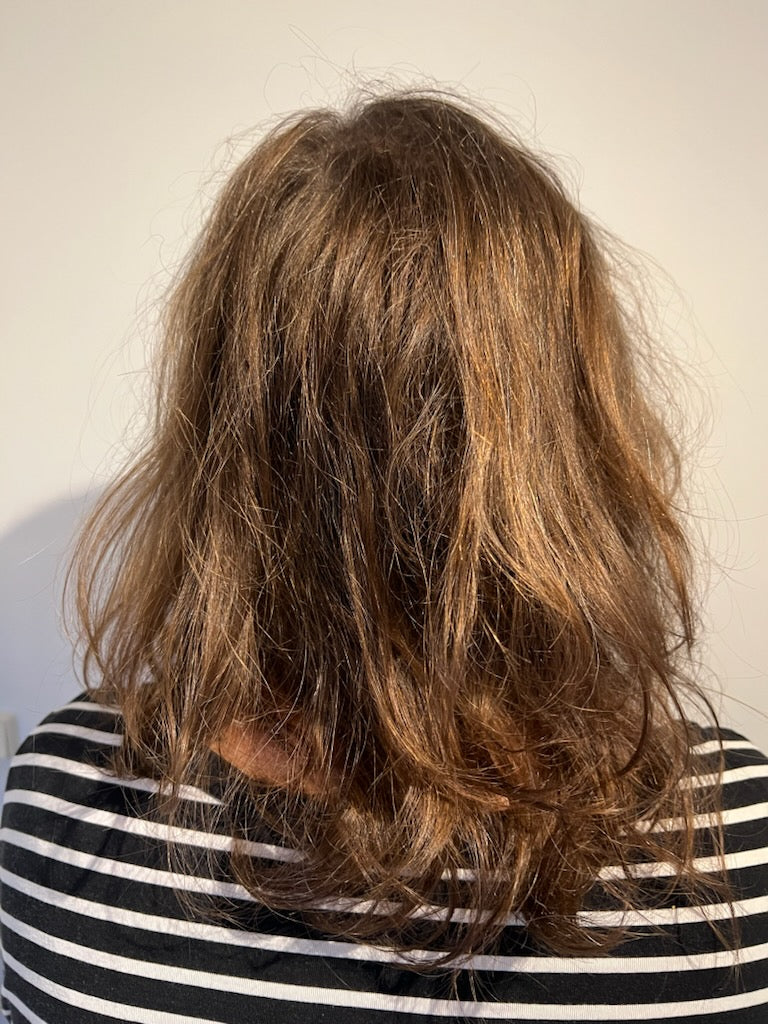Tina , 61 years old, on sick leave. Married and has two adult sons. Lives in North Zealand.
Was diagnosed with breast cancer in the summer of 2024. Has undergone 12 chemotherapy treatments and is currently undergoing radiation treatments.
In the midst of the enormous loss of control of the cancer diagnosis, it has been important for Tina to hold on to some normality – and Tina wouldn't be the same Tina without her long, brown hair. The chemo has made her hair thinner, but with the cold caps it hasn't completely disappeared, so she has looked like herself and had control over who she wants to share her illness with.
WHAT DID IT MEAN TO YOU THAT YOU KEPT MOST OF YOUR HAIR AFTER CHEMOTHERAPY?
It has had such a huge impact on my life quality that I have kept so much of my hair that I still look like myself. My illness is a private matter, and I don't want to share it with the neighbors or the rest of the world. A cancer diagnosis is a huge loss of control, and just being able to try to do something to keep my hair gave me a little bit of control back.
My hair has become very thin, but it is very evenly distributed, and I can go shopping without the store being quiet because 'someone comes in sick.' No one can see that I am sick, and you have to know me well to see that my hair has become thinner.
WHAT DOES YOUR HAIR MEAN TO YOU?
I've always had long, brown hair, and it's part of who I am. I wouldn't be me without my hair. At first I probably thought, 'it's just hair, the most important thing is that I survive'. But it's not just hair when it's part of your identity. The rug has been torn out from under you with the diagnosis, and your entire old self is gone. Then it's important to be able to recognize yourself in the mirror, and there's just a little bit of normality left in a world where everything else has been turned upside down.
It's now been 7 weeks since my last chemo treatment and I'm waiting for my hair to start growing back. I wake up and I'm worried that all my hair is on the pillow and I'm anxious about combing my hair in the morning. I'm still shedding, and although I don't know if I'm shedding more or less than before my illness, every single hair I lose means a lot more now.
HOW HAS YOUR EXPERIENCE BEEN WITH THE COLD CAPS?
I simply had to try cold caps because I was panicking about losing all my hair. It's not exactly a party to have your brain "frozen" and both my husband and I tried them before the treatment and thought, 'we can't stand this'. But you can do it, and it also gets less uncomfortable with each cap.
During the first type of chemotherapy I didn't lose any hair, and perhaps a little naively, I expected not to lose any hair at all. But when I got the 'red' chemo, the hardest, the devil took hold of my hair, and I lost it at 550 kilometers per hour! There were brown locks all over our white stairs. But without the cold caps I would have gone bald. I can see that in other people undergoing treatment – I stand out by being 'the one with hair'.
WHAT HAS BEEN THE GREATEST SUPPORT FOR YOU DURING YOUR PROGRESS - BOTH EMOTIONALLY AND PRACTICALLY?
My husband, who has been there 500 percent… he even tried the cold caps! He has been there for every single treatment, and he has changed cold caps on me every half hour and managed the time, because I couldn't concentrate on it. I have friends who would jump in, but it's very vulnerable and personal, and I wasn't in the mood to talk.
The cold cap has of course been hugely important because I have kept most of my hair and have been able to hold on to an important part of myself. The most grotesque thing has been that the doctors don't say anything. The nurses are used to people coming in with cold caps, and they are so nice, and you get extra space. But from the doctors I got a 'wait for the red chemo, then it will all fall off'. When I have come in for an interview afterwards – WITH hair – I have either been told 'is it a wig' or... nothing.
WHAT ADVICE WOULD YOU GIVE TO OTHERS WHO ARE FACING POSSIBLE HAIR LOSS?
Be prepared that hair can still be a big stress factor when using the cold cap – at least it was for me. The fear of losing your hair still lingers in you, because most people lose it after having chemotherapy, even if you use a cold cap – some just more than others. But I talked a lot with Annette from Rapunzel, who is behind the cold caps, about it along the way. She has been through it herself, and she was a huge support for me.
Of course, you also have to be prepared that you can't do it alone. You can't change a cold cap yourself when you have an IV in your arm, and they have to be changed about every half hour - I used 10 for each treatment, so my husband has been hardcore and changed a lot of cold caps on me!
5 ADVICE FROM TINA:
1. It is important to have someone by your side, both to help transport the heavy cooler bag and change the cold caps, but also to just be there.
2. You'll freeze with the cold cap on, so have blankets, a thick sweater and hot drinks ready – regardless of the season.
3. Use serum on your eyebrows and lashes. I have always used serum on my lashes, even after they fell out, and after my last chemo they grew back in just 4 weeks.
4. It's important to take good care of your hair. I was offered a makeup course through the hospital, where I was given a lot of good, caring products.
5. Give your hair as much rest as possible – wash it only when necessary and comb it very carefully.

